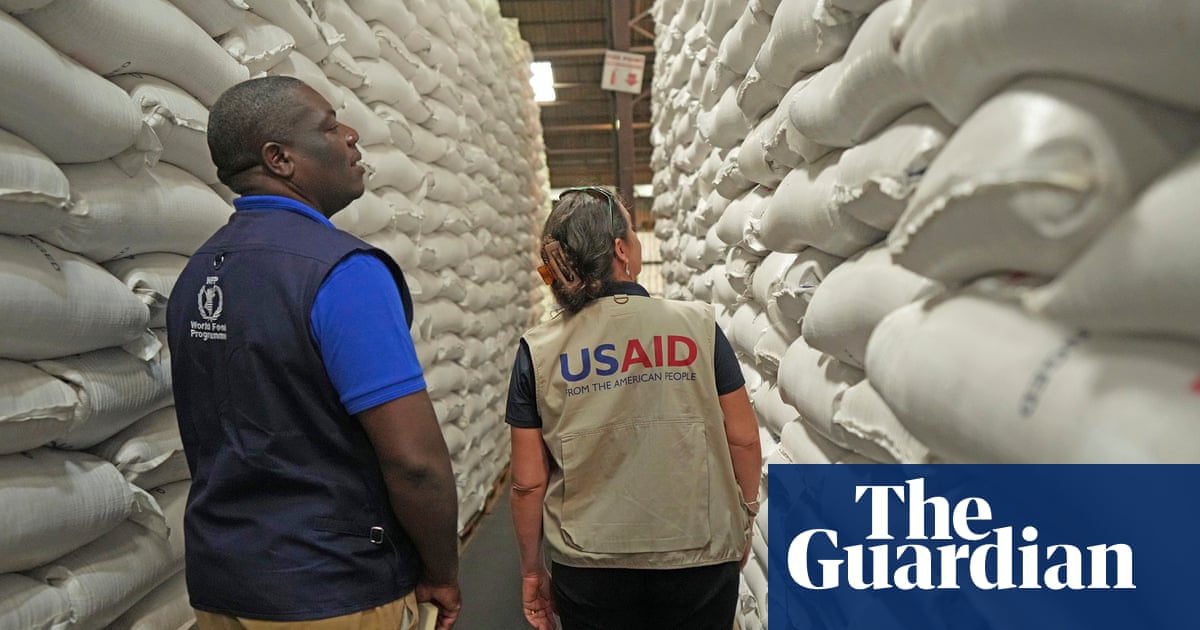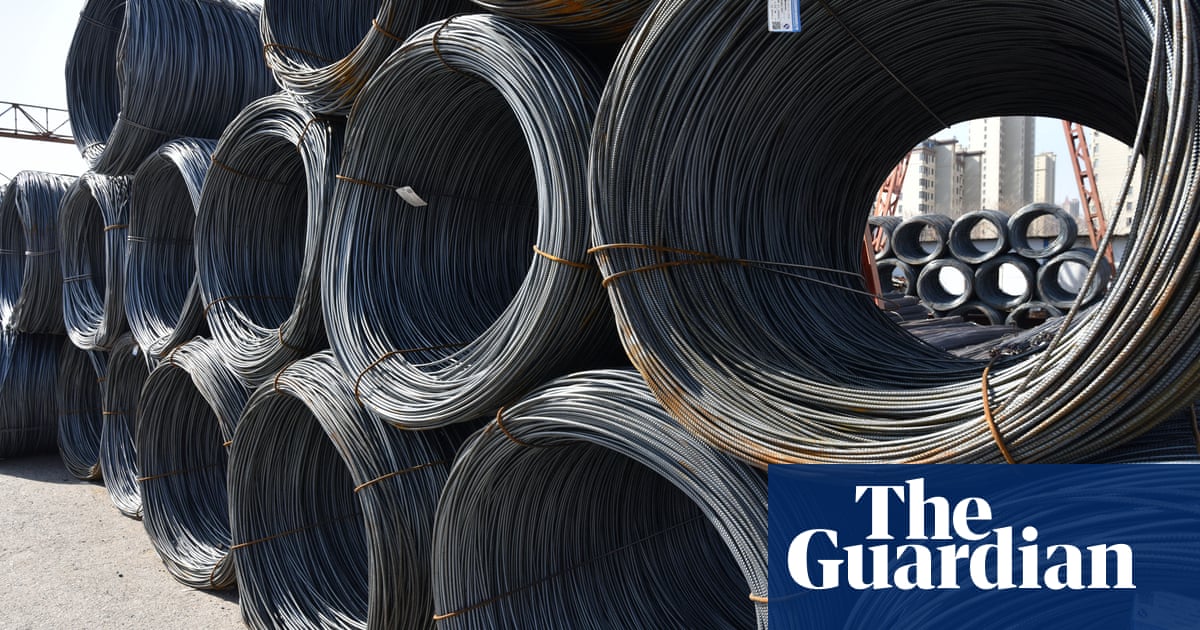Trump to announce 25% aluminum and steel tariffs as China’s levies against US come into effect

Helen Davidson
Donald Trump has said he will announce new 25% tariffs on all steel and aluminum imports into the US on Monday that would affect “everybody’, including its largest trading partners Canada and Mexico.
Trump’s pre-announcement came as China’s retaliatory tariffs, announced last week, came into effect. The measures target $14bn worth of products with a 15% tariff on coal and LNG, and 10% on crude oil, farm equipment and some vehicles.
The move on steel and aluminum brought a swift reaction from Doug Ford, the premier of the Canadian province of Ontario, who accused the US president of “shifting goalposts and constant chaos” that would put the economy at risk.
Monday’s tariffs would come on top of existing metals duties.
The largest sources of US steel imports are Canada, Brazil and Mexico, followed by South Korea and Vietnam, according to government and American Iron and Steel Institute data.
The US president, speaking to reporters on Air Force One on Sunday, also said he would announce reciprocal tariffs – raising US tariff rates to match those of trading partners – on Tuesday or Wednesday, which would take effect “almost immediately”.
“And very simply, it’s, if they charge us, we charge them,” Trump said of the reciprocal tariff plan.
You can read Helen Davidson’s report in full here: Trump to announce 25% aluminum and steel tariffs as China’s levies against US come into effect
Key events Show key events only Please turn on JavaScript to use this feature

Ben Makuch
Ben Makuch writes for the Guardian today examining the legality of Elon Musk’s actions in attempting to gut the US federal government operation:
In 2025, as a “special government employee” heading up the “department of government efficiency” (Doge), Elon Musk is going to war with government diversity and inclusion programs and slashing whatever he sees as a “waste” of public coffers.
But legal resistance is mounting, as Doge faces countless lawsuits alleging everything from privacy concerns to free speech violations, which all leads to one important question: is any of this even legal?
Laurence Tribe, one of the nation’s leading and preeminent constitutional scholars and a professor emeritus at Harvard Law School, has already argued that much of Trump’s blitzkrieg of executive orders on the day of his inauguration disregards the US constitution. He told the Guardian he saw Musk’s actions as furthering that culture.
On whether or not Doge and Musk can legally have this much power over an array of government departments, Tribe was emphatic: “NO.”
Musk has applied a buckshot method across the government, offering CIA agents walking papers while appraising the Department of Education – all at the same time.
Tribe said the lack of guardrails being placed on Doge’s maverick initiatives, raises “both” questions of illegality and ethical wrongdoing that can be challenged in court. As for Musk’s status as a federal contractor (such as his StarLink work with the Pentagon) and now a government employee, Tribe sees it as “absolutely” a legal conflict of interest.
Read more from Ben Makuch here: Elon Musk’s gutting of US agencies is illegal, experts say. How do you muzzle Doge?
Kremlin coy on whether Trump and Putin have held phone conversation
The Kremlin was coy on Monday morning on whether US president Donald Trump has spoken directly with his Russian counterpart Vladimir Putin.
Speaking during his regular daily press briefing, Reuters reports Putin’s spokesperson Dmitry Peskov said he was unable to say more about the subject, adding “I made a statement to that effect yesterday. And there is nothing else I can say. I can neither confirm nor deny it.”
Asked by reporters onboard Air Force One on Sunday whether he had held a call with Putin since becoming president on 20 January or before, the US president said: “I’ve had it. Let’s just say I’ve had it. And I expect to have many more conversations. We have to get that war ended. If we are talking, I don’t want to tell you about the conversations.”
Federal judge halts Trump administration bid to move detained Venezuelan men to Guantánamo Bay
A federal judge has barred the US government from sending three detained Venezuelan men to the navy base at Guantánamo Bay in Cuba, according to the men’s lawyer.
Associated Press reports a legal filing to a US district court in New Mexico was granted during a brief hearing by Judge Kenneth J Gonzales. The lawyers for the men argued that the detainees “fit the profile of those the administration has prioritized for detention in Guantánamo … [and] the mere uncertainty the government has created surrounding the availability of legal process and counsel access is sufficient to authorize the modest injunction.”
Jessica Vosburgh, an attorney for the three men, said “It’s short term. This will get revisited and further fleshed out in the weeks to come.”
The government opposed the action.
White House press secretary Karoline Leavitt said on Wednesday that more than 8,000 people have been arrested in immigration enforcement actions since Trump’s inauguration, and Homeland security secretary Kristi Noem said last week that flights of detainees had already landed at Guantánamo. Immigrant rights groups fear the site will become a “legal black hole.”
Trump says he is ordering US treasury to stop minting pennies
Donald Trump has said he will stop the US treasury issuing pennies, stating that the one cent coins are a waste of money.
In a message on the Truth Social platform that he owns, Trump said:
For far too long the US has minted pennies which literally cost us more than two cents. This is so wasteful! I have instructed my secretary of the US Treasury to stop producing new pennies. Let’s rip the waste out of our great nations budget, even if it’s a penny at a time.
The penny was first issued by the US government in 1793. The Hill website reports that, according to the US mint’s annual reports, the cost of manufacturing one cent pieces has been above its face value for 19 consecutive years.
Reuters reports that Germany’s government has said it was working to prevent the Trump administration imposing tariffs on trade with Europe.
An economy ministry spokesperson said Berlin is “working towards ensuring that these measures do not materialise”, adding that economy minister Robert Habeck had met with EU trade commissioner Maroš Šefčovič to discuss the issue on Monday.
In our business blog today, my colleague Graeme Wearden reports that Donald Trump’s tariff interventions are leading some to describe the markets experiencing a “febrile February” with volatility high on the agenda.
He quotes Richard Hunter, head of markets at interactive investor, who said “Tariffs remain central to the uncertainty, with President Trump’s latest announcement on Sunday likely to keep investors on edge this week. He has threatened reciprocal tariffs across the board to equal the rates being charged to the US, quite apart from a 25% levy on the import of steel and aluminium.”
As David Goldman and Chris Isidore note for CNN:
While the US is not the manufacturing-focused economy it once was, it still consumes tens of millions of tons of steel and aluminum a year, feeding industries such as automaking, aerospace, oil production, construction and infrastructure, such as roads and bridges. Tariffs would increase the cost of production in those industries both because of the increased cost of the imported steel, and because domestic steel and aluminum makers could raise the price of their products due to the reduced competition from low-priced imports. Canada and Mexico are the largest and third largest exporters of steel to the US, respectively.
It wasn’t entirely clear from Trump’s interview on Sunday when new tariffs would be expected to come into effect, and whether they were on top of his previously announced measures against Canada, Mexico and China.
Trump to announce 25% aluminum and steel tariffs as China’s levies against US come into effect

Helen Davidson
Donald Trump has said he will announce new 25% tariffs on all steel and aluminum imports into the US on Monday that would affect “everybody’, including its largest trading partners Canada and Mexico.
Trump’s pre-announcement came as China’s retaliatory tariffs, announced last week, came into effect. The measures target $14bn worth of products with a 15% tariff on coal and LNG, and 10% on crude oil, farm equipment and some vehicles.
The move on steel and aluminum brought a swift reaction from Doug Ford, the premier of the Canadian province of Ontario, who accused the US president of “shifting goalposts and constant chaos” that would put the economy at risk.
Monday’s tariffs would come on top of existing metals duties.
The largest sources of US steel imports are Canada, Brazil and Mexico, followed by South Korea and Vietnam, according to government and American Iron and Steel Institute data.
The US president, speaking to reporters on Air Force One on Sunday, also said he would announce reciprocal tariffs – raising US tariff rates to match those of trading partners – on Tuesday or Wednesday, which would take effect “almost immediately”.
“And very simply, it’s, if they charge us, we charge them,” Trump said of the reciprocal tariff plan.
You can read Helen Davidson’s report in full here: Trump to announce 25% aluminum and steel tariffs as China’s levies against US come into effect
Welcome and opening summary …
Welcome to the Guardian’s rolling coverage of the second Donald Trump administration and US politics. Here are the headlines …
-
Donald Trump has said he will announce new 25% tariffs on all steel and aluminum imports into the US on Monday that would affect “everybody”, including its largest trading partners Canada and Mexico.
-
A federal court has blocked the Trump administration from sending three Venezuelan immigrants held in New Mexico to Guantánamo Bay naval base in Cuba.
-
Russell Vought, Trump’s newly installed acting head of the US Consumer Financial Protection Bureau, announced at the weekend he had cut off the agency’s budget and reportedly instructed staff to suspend all activities.
-
Trump said that he expects Elon Musk to find “billions” of dollars of abuse and fraud in the Pentagon during an interview with Fox News’s Bret Baier that aired before the Super Bowl on Sunday.
-
Trump also said during the interview that he is serious about wanting Canada to become the 51st state.

 German (DE)
German (DE)  English (US)
English (US)  Spanish (ES)
Spanish (ES)  French (FR)
French (FR)  Hindi (IN)
Hindi (IN)  Italian (IT)
Italian (IT)  Russian (RU)
Russian (RU)  13 hours ago
13 hours ago
























Comments